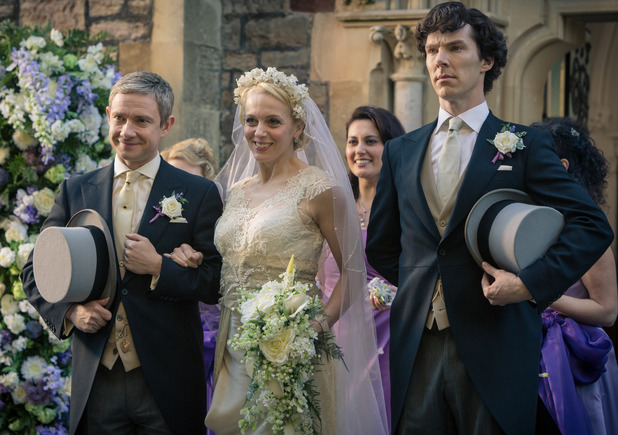 |
| Courtesy of the BBC |
Therefore, they are clearly the reactions of a stubborn viewership who wants what they love to remain as still as statues. In which case, I invite such persons to purchase the series one DVDs and wear them out. Because in a good and decent world, actions have consequences, people grow and time moves on. And so it in the world of Sherlock, where a two year separation from each other, and the undated courtship of Mary Morstan have brought Sherlock to a very uncomfortable place: the realization that he is, after all, only human.
Hit the jump for the review, which contains spoilers that hate dancing.
First off, this is a first for the series, a collaborative episode credited to all three of the series writers. Whether they structured it this way, which each taking one of the three storylines, or if Thompson turned in his draft and Moffat and Gatiss decided they had some things to add is unknown. The results though, were fantastic. It may just have become my favourite episode of the series. An unusual, but not insurmountable, narrative structure. A bold statement about the evolution of the characters. And more than ample opportunity to merge the comedic with the sentimental. This series has taken a sharper turn towards the humourous than the previous two, which weren't unfunny, and this episode really played things for laughs. But it makes sense, at least to me, because this is, underneath everything, a painful episode. Someone as unaccustomed to emotion as Sherlock, and suddenly he is feeling quite a lot of it, and none of it happy (he is still a selfish person, lets not forget). What better way to cover up that misery then with humour?
This episode also contains the least similarities to any of the established canon of Doyles' stories of anything they've done. The update has always taken liberties, but this one falls firmly into "in name only" territory. And considering that the episode is three interwoven tales, that none of them broach the canon with anything more substantial than fleeting references is impressive. The writers are comfortable to add their own original works to the legacy of Baker Street. Good for them. And more impressively, everything held together. No glaring plot holes, no threads left dangling, and no obvious sign of the series Big Bad at work. In that way, it reminded me of series one, in which Moriarty's hand was felt the least in the second of the three episodes. This was just a wedding, or more to the point, just a wedding speech, wisely avoiding the cliches of the wedding scenario in favour of what is essentially and hour and half of Benedict Cumberbatch talking.
We also got a brief cameo by Irene Adler, which marks the second surprise visit from an old friend this series (after Moriarty's slash fiction appearance last week). Makes you wonder who will return for the finale? Makes you wonder if things aren't being brought closer to a conclusion. Because things seem to be building towards something in a big way. If a fourth series were certain, I might guess that they are taking their time introducing Magnussen, in the same way that Moriarty took two series to play out. However, things seems far more immediate in the wake of Sherlock's various confessions here. The high regard in which he holds John, the connection he has with him, and his vow to protect him and Mary (and the Watson presumptive) at any cost. It all seems to be leading towards something rather heart breaking.
Mary is fitting in very well. The writers have done a wonderful job with the character, who was introduced only three hours ago, and seems like she's spent year with them on Baker Street. She's a quick read of people, as masterful a manipulator as Sherlock (if not more so), and just as bright and cunning as the duo. She fits a little too well, and the cynic in me suspects that if she isn't an agent of Magnussen (and her orphan heritage might make that seem likely), then she'll come to a bad end by his hand. The Mary of the books was dispensed with during Sherlock's sojourn, and there was never a Watson Jr. Which makes the potential of her survival, or at least a continued and happy matrimony with John unlikely.
It wasn't just Sherlock getting the character upgrade. This was very much a character driven piece, and all the Irregulars got a bump in the standings. Quite a lot of Mrs. Hudson's back story was filled in, with a weird Scarface-like history. Lestrade's life seems to have taken a hit, giving up a high profile bust following a prolonged series of failures, and left to drink alone at the wedding. Molly's life has seen an improvement, as with it has come a new confidence we've not seen in her yet. And special mention must be made of the episode guest Yasmine Akram as the head bridesmaid, whose flirty possession of Sherlock gave him a moment's hope of his own personal connection, then stole it away. Despite his confession that he enjoys dancing.
One element often left out of Holmes adaptations, but at the very core of this episode, is the true and honest friendship between the two men. Often, Watson gets treated like Holmes' employee, but here he is rightly regarded as his equal, a position that it has taken Sherlock this many years to realize he inhabits. More and more, Sherlock is beginning to realize that people aren't goldfish, and that it isn't a weakness. Now we wait to see where that leads him.